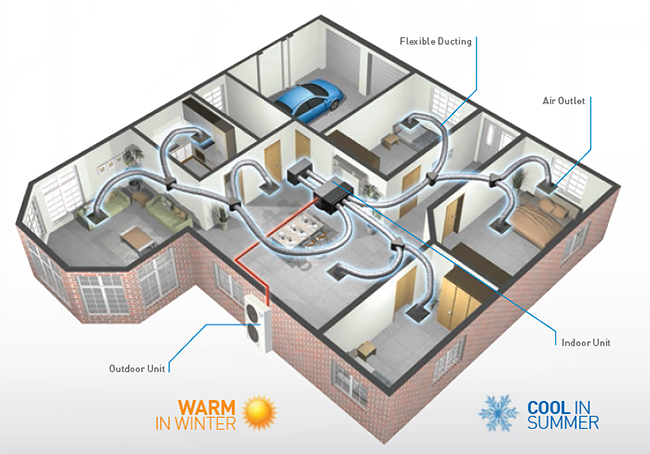In the current accelerated world, establishing a comfortable residential or working environment is crucial for both efficiency and health. Here is where HVAC units play a significant role. Knowing how to improve your HVAC system can make a significant difference in your satisfaction, utility costs, and overall indoor air quality. If you are a property owner wanting to upgrade your climate regulation performance or a company leader seeking to create a positive work environment, knowing the ins and outs of your HVAC system is crucial.
This guide will guide you through everything you need to learn about HVAC systems, from introductory concepts to sophisticated strategies for optimization. We will cover common problems and their solutions, maintenance suggestions for ensuring your system functioning optimally, and how to choose the right system for your particular requirements. Equipped with the right information, you can ensure your HVAC system adds to a clean and pleasant environment while also being efficient in energy use.
Comprehending HVAC
Heating, ventilation, and air conditioning refers to heating, ventilation, and air conditioning. It is a detailed framework designed to provide thermal well-being and adequate indoor air quality. Grasping how these systems work can assist homeowners make informed decisions about their heating and cooling needs. A well-optimized HVAC system is essential for keeping a pleasant living environment throughout the seasons.
At its essence, an HVAC system operates by utilizing various parts, including furnaces, air conditioners, heat pumps, and airflow setups. These elements work together to manage indoor heat levels and humidity while guaranteeing proper air circulation. Recognizing how air conditioner installation interact can help you diagnose common concerns and improve system efficiency. This interconnectedness underscores the significance of understanding both the individual parts and the entire system.
Regular maintenance is key to the durability of HVAC systems. Routine inspections and prompt repairs can avoid minor problems from becoming major complications, keeping that your system runs smoothly and correctly. By learning yourself with the essentials of your HVAC system, you can take proactive steps to optimize its functionality, lower utility bills, and enhance overall well-being in your home.
HVAC upkeep and Troubleshooting
Frequent maintenance is essential for making sure your HVAC system operates efficiently and endures for many years. This includes tasks such as swapping out air filters, cleaning the condenser and evaporator coils, and checking the refrigerant levels. A fresh filter not only helps preserve good airflow but also enhances indoor air quality. Scheduling annual certified inspections can help spot small issues before they turn into serious problems, preserving you effort and cash in the future.

One of the most typical issues that HVAC systems deal with is poor airflow, which can be caused to blocked vents or ducts, a dirty filter, or even broken fans. If you notice discrepant temperatures in multiple rooms, it is essential to check the airflow and ensure that no objects is hindering the vents. In some instances, you may need to reset the thermostat to boost performance. Paying attention for unusual noises from the system can also indicate potential problems that need urgent attention.
When dealing with HVAC troubleshooting, it is essential to know when to repair and when to replace. If your system is frequently breaking down, is over ten years old, or demands costly repairs, it may be more economical to purchase a new system. Be aware of the warranty terms and service options available for your unit, and consider modern solutions that enhance energy efficiency. Adopting smart technology can also provide more control over your system and help lower energy bills.
Energy Efficiency and Advancements in Heating, Ventilation, and Air Conditioning
The HVAC industry has seen significant improvements in energy optimization, driven by the demand for sustainable solutions and cost-effective heating and cooling. Modern systems are designed to lower energy consumption while improving comfort. Technological advancements such as adjustable-speed compressors, advanced heat exchangers, and improved insulation materials contribute to lower energy expenses and improved performance. These technologies allow HVAC systems to respond to varying environmental conditions, ensuring peak efficiency throughout the year.
Connected heating and cooling systems have emerged as a game-changer in energy efficiency management. These systems can link to the web, allowing homeowners and companies to observe and control their heating and cooling units from anywhere. Features such as scheduling, adaptive algorithms, and integration with IoT devices enable users to make thoughtful decisions about energy use. By adjusting settings and usage patterns based on live analytics, these systems can significantly reduce energy consumption and energy bills.
Investing advanced HVAC solutions not only enhances comfort but also promotes sustainability objectives. Efficient heating and cooling systems often qualify for financial incentives and incentives, making them an desirable option for property owners. Additionally, developments like solar energy HVAC systems and geothermal heating and cooling showcase the promise for integrating renewable energy sources. As the focus on environmental responsibility continues to grow, utilizing these innovations will be key for both residential and commercial applications in the pursuit of energy conservation.
